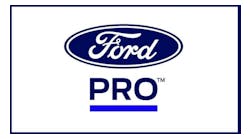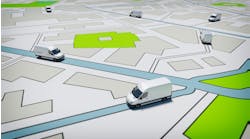Amotorist called Barry Kindt one day and told him, "One of your pickup trucks just passed me, and something flew out of the back of his truck and landed on my car."
The call was of obvious concern to Kindt, president of SECCO Inc. and SECCO Home Services in Camp Hill, Pa. But how could he get to the bottom of it?
Recently, someone called Roger Peugeot, president of Roger the Plumber in Overland Park, Kan., to say that one of Peugeot's trucks had hit his truck about an hour earlier, but that the driver of Peugeot's truck had not stopped.
"I also got a call from someone else, on a different day, who said that one of our trucks had forced the driver off the road, causing him to blow three tires," Peugeot recalls.
He, as Kindt did, wanted to get to the bottom of these instances. But how?
Track record
Fortunately, both service contractors are satisfied users of global positioning satellite technology. Research into their systems was able to get to the bottom of all three incidents.
"With GPS, you know where your trucks are at all times," explains Kindt, a member of the Nexstar best practices group. "You can also monitor events, such as starting and shutting off the trucks, opening and shutting the truck doors, and you can even clock driving speeds."
SECCO has 40 vans and only two pickup trucks, so it was easy to track down who the driver of the pickup was. It turns out that he was supposed to be onsite at one of SECCO's best commercial accounts working on a project. Investigation showed that he had not been where he was supposed to be, Kindt says.
"We went back and did more checking on where he had been for some planned maintenance work and found that, again, he had not been where he was supposed to have been and had not done the planned maintenance," Kindt says. "We got rid of him."
In investigating the first of his two cases with his GPS system, Peugeot found that none of his trucks had even been in that neighborhood that day, he says. The driver who called Peugeot, who owns a delivery company, had been mistaken.
"I invited him over to see our system," says Peugeot, who belongs to Quality Service Contractors, which is part of the Plumbing-Heating-Cooling Contractors — National Association. "He was so fascinated that he did come over, and I showed him how the system worked."
The man ended up purchasing GPS units for all 25 of his trucks. It turned out that the vendor who had sold Peugeot his system — AtRoad — had a spif for referrals of $20 per unit, providing Peugeot with $500 for his efforts.
As for the second incident, a review of the GPS history showed that none of Peugeot's trucks had been in the area at that time. In fact, he didn't have a truck on that street all day long.
Peugeot then called the police, because he felt the caller was trying to pull a scam. A police GPS expert came over and studied Peugeot's system and realized that he could not have manipulated the information. End of case.
GPS benefits
When Peugeot purchased his GPS system five years ago, he admits that most of his employees were worried about "Big Brother" watching them. Instead, the system actually benefits everyone and even frees them up, he says. When they get to a job, for example, they don't have to call in to report their arrival. The GPS system relays the information automatically.
"In addition, if there is any concern on the customer's part about the time we were there, we have an electronic document showing what time we arrived and what time we left," he says.
At the end of each job, plumbers have a keyboard on their dashboard, where they can key in the sale, the check number, the check amount and any other information that is needed. This information arrives on the dispatcher's PC.
Security is another benefit. "If someone stole one of our trucks, we could track it," Peugeot says. "And if an employee wanted to moonlight with one of our trucks, we could determine if had been moved at night."
The system also shows the location of all gas stations and when gas was purchased, which allows Peugeot to find out if employees are purchasing gas for their own vehicles but charging it to the company.
"For example, if we see that someone purchased gas at 11 p.m., but the truck was parked at our office, we know they didn't buy it for the truck," he says. "This feature is particularly beneficial considering the price of gas these days."
In addition, the system can measure the effectiveness of dispatchers, Peugeot says. He can look at the routes of all 15 of his trucks each day to make sure the dispatcher didn't have them crossing over each other.
"Of course, there could be a good reason for this, such as a situation of urgency or a timed appointment," Peugeot notes.
Still another benefit relates to safety. Roger the Plumber has a maximum speed limit of 55 mph for its drivers. The company reviews the GPS report every day, and if it finds someone driving faster than 55, the driver is reprimanded.
"Since setting up our GPS system," Peugeot says, "we have not had one accident due to speeding."
Kindt realizes benefits from his GPS system as well.
"For example, if a technician needs parts or help, we can look on the GPS system to find out who is closest to where is he and move people to help him, or go help him ourselves," he says.
And, of course, the system helps to identify fraudulent performance. In fact, the very first week SECCO had the GPS in operation, one plumber evidently either didn't understand its power or thought management was bluffing about tracking activity. He had been assigned to a contract project about 30 miles from the office. He later called in to say he was checking out for the day and getting ready to leave the site. A review of the GPS system, however, found out that he was calling from his home, Kindt says.
Additional technology
Besides GPS, Peugeot and Kindt say they use other technology to maintain a competitive edge and keep costs down.
Peugeot's dispatching software is tied into Nextel, he says. Once the customer's name and address are entered, the system provides a map code to show what part of town the address is located. When it's time to dispatch the call, one click of a button sends the name, address, map code and problem code to plumber, so he knows where to go and what he's going to be doing.
" This lets him walk to the door with the right kind of tools," Peugeot explains. "The system also has room for a lot of other useful information. For example, if the call is from a repeat customer, the system will have historical information on the customer, such as an alternate contact person — maybe the son or daughter of an older woman, so they can authorize the work for that person— and whether they have a dog."
Besides GPS, SECCO utilizes electronic road atlas technology. These are electronic maps that technicians have in their trucks so they can find their way from call to call.
"This reduces a lot of their stress," Kindt says. "They can focus on driving, rather than having to slow down at every intersection to find out if they need to turn or not."
Although the price for fleet management technology can vary, Kindt says it has been worth the price for his operations. Startup costs for his Teletrac system were $500 to $600 per vehicle, plus he pays $30 a month per vehicle. He believes that other service contractors can benefit from this kind of investment.
"Start yesterday," he says. "If you can't start yesterday, start today. For the amount of money we pay for GPS, it has turned out to be an awesome tool."

